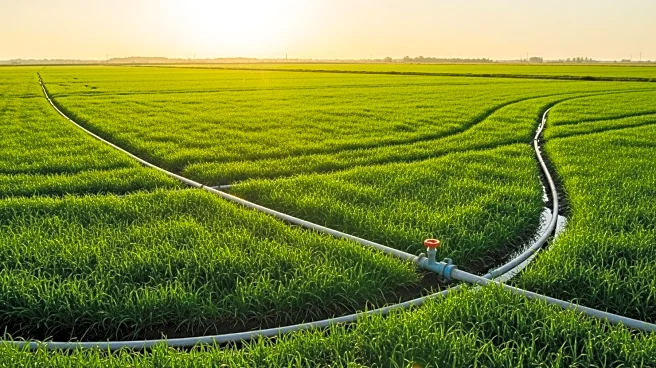What's Happening?
Egypt is targeting EGP 144.8bn ($3bn) in investments for agriculture and irrigation sectors in the fiscal year 2025/26. The plan, announced by the Ministry of Planning, Economic Development and International Cooperation, includes EGP 17.5bn in public investments and EGP 127.4bn in private investments. Key priorities include expanding land reclamation, improving crop yields, modernizing irrigation systems, and increasing livestock development. The plan aims to achieve self-sufficiency in white meat and fish, increase red meat self-sufficiency to 60%, and expand agricultural exports. The Ministry of Water Resources and Irrigation will focus on canal rehabilitation and building infrastructure to enhance water resource efficiency.
Why It's Important?
The investment plan is crucial for Egypt's food and water security, supporting national economic growth and industrial capacity. By modernizing agriculture and irrigation, Egypt aims to boost productivity and reduce reliance on imports, enhancing its position in global markets. The focus on sustainable practices and resource management aligns with broader environmental goals, potentially mitigating the impacts of climate change. The plan's emphasis on expanding exports could strengthen Egypt's trade relationships and contribute to economic stability.
What's Next?
The implementation of the investment plan will involve collaboration between public and private sectors, with ongoing monitoring and evaluation to ensure progress. The Ministry of Water Resources and Irrigation will continue developing infrastructure projects, such as the New Deirout Barrage, to improve irrigation efficiency. The success of these initiatives may lead to further investments and policy adjustments, supporting long-term agricultural and economic development.
Beyond the Headlines
The plan reflects Egypt's strategic approach to addressing food security and resource management challenges. It highlights the importance of sustainable development in achieving economic resilience and environmental sustainability. The focus on expanding exports and improving infrastructure may influence regional trade dynamics and contribute to broader geopolitical stability.










